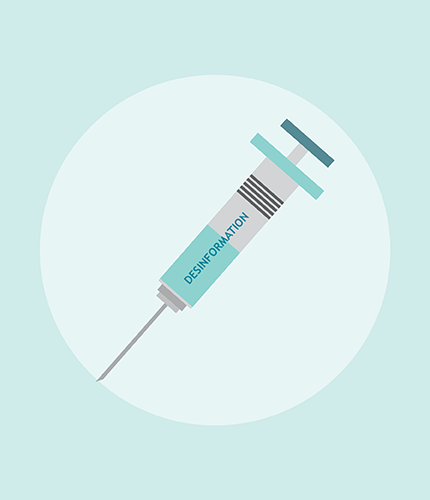5 Tips for Dealing with Corona Vaccination False Reports
The Corona vaccine alters the genetic make-up, all people are to be compulsorily vaccinated and, in addition, a microchip is implanted with the vaccination in order to control people. Such and similar false claims have been spread in social networks and messenger services for months. The most successful false reports and conspiracy narratives are those that connect to existing concerns or uncertainties.
The major platforms are increasingly faced with the challenge of deciding where an opinion on vaccination ends and where vaccination disinformation begins. Facebook, Twitter and YouTube in particular have been trying for months to take stronger action against fake news and conspiracy narratives by issuing warnings or even deleting posts. Since December, they have now been focusing on disinformation about the Corona vaccination. The goal here is to protect people from false reports that can have serious negative effects on opinion formation. For example, a recent U.S. study concluded that there is an overabundance of information about Covid-19, some of which is correct and some of which is false. This overabundance makes it very difficult for many people to recognize which sources are actually reliable and trustworthy.
5 Tips - How to deal with fake news and conspiracy theories about the Corona vaccine?
Fake news and conspiracy narratives are not always immediately recognized as such. Especially when it comes to Corona and the vaccines, it may not be easy for lay people to judge whether there could be something to a claim after all. With these 5 tips, you can better protect yourself and others from disinformation:
- Take a critical look at headlines
If someone wants to spread false news or conspiracy theories with the greatest possible reach, lurid headlines are often used to emotionalize readers. The following applies: If shocking claims in a headline sound improbable, one should examine the further content with great skepticism.
- Check sources
Who is actually behind the report? Does the information given come from a source that is trusted and credible? If no source is given at all or if reference is made to unnamed experts, the report should be evaluated very critically.
- Check the facts
Is the information really correct? Have other, trustworthy news sources published the same report? Or has something been invented, taken from another context or presented in an abbreviated form without taking all the facts into account? Fact checkers such as CORRECTIV, ARD-Faktenfinder or mimikama can help clarify the situation. Currently, many fact checks on reports about Corona and the Corona vaccination can be found there. Among other things, the Munich Clinic has also fact-checked 36 popular reports on Corona.
- Point out false news
Have people in your personal circle shared a false news story or content from conspiracy ideologues? Perhaps they did not know that the content came from an unserious source. If so, it is important to respectfully point this out in a private message. But be careful: some topics can greatly inflame tempers in a discussion. Such debates are not very productive.
- Don't share, report
Inappropriate content, false reports and conspiracy ideologies can also be reported directly to online services. This should be done in any case if the content is right-wing extremist, glorifies violence, is anti-Semitic or endangers health. We have collected information and links to complaints offices here. At Kompass Social Media, the reporting options of well-known online services are explained clearly.
Shaping opinions between fact and fake as the theme of Safer Internet Day 2021
Anyone who informs themselves on the Internet is exposed to a multitude of messages, some of which are not messages at all. klicksafe is making "Opinion formation between fact & fake" the theme of Safer Internet Day on February 9, 2021.
Further information

